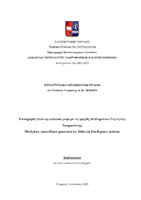Επιτήρηση στον εργασιακό χώρο με τη χρήση συστημάτων τεχνητής νοημοσύνης
Workplace surveillance generated by artificial intelligence systems

Προβολή/
Λέξεις κλειδιά
Επιτήρηση ; Εργαζόμενοι ; Εργασιακός χώρος ; Συστήματα τεχνητής νοημοσύνης ; Προσωπικά δεδομένα ; Πρόταση κανονισμού τεχνητής νοημοσύνης ; Surveillance ; Workplace ; AI systems ; GDPR ; AI act proposalΠερίληψη
Στην παρούσα εργασία μελετάται η επιτήρηση των εργαζομένων στον εργασιακό χώρο με συστήματα Τεχνητής Νοημοσύνης. Αρχικά, προσεγγίζεται η έννοια της Τεχνητής Νοημοσύνης και των συστημάτων, τα οποία η ίδια τροφοδοτεί, καθώς και η συνεισφορά των αλγορίθμων στην εν λόγω λειτουργία. Η ίδια η έννοια της επιτήρησης εξυπηρετεί διαφορετικό σκοπό, όταν πραγματοποιείται με τη λειτουργία των συστημάτων και διακρίνεται από τα έως τώρα παραδοσιακά μέσα. Η επιτήρηση μεταβάλλεται αναλόγως του χώρου, όπου χρησιμοποιείται και συνήθως περιλαμβάνει δύο βασικούς παράγοντες, τον εργοδότη και τον εργαζόμενο. Έπειτα, γίνεται μια προσπάθεια εντοπισμού του ιδιαίτερου ρόλου της ΤΝ στην επιτήρηση και αναλύεται το πεδίο εφαρμογής της. Παρατίθενται δε, τα εργαλεία και οι μέθοδοι επιτήρησης, τα οποία απαντώνται συχνότερα, ενώ αναδεικνύεται ο θετικός αντίκτυπος που μπορεί να εισφέρει η ΤΝ στον εργασιακό τομέα. Κατόπιν, ξεκινώντας από τη διερεύνηση των λόγων, αναλύονται κίνδυνοι που εγκυμονούν στον χώρο εργασίας και έχουν ως επίκεντρό τους ίδιους τους εργαζομένους. Η αξιοποίηση υπαρχόντων και επικείμενων νομοθετικών εργαλείων στον τομέα της προστασίας των εργαζομένων αποτελεί θεμελιώδους σημασίας προσέγγιση για την συνύπαρξη των ιδίων και των συστημάτων Τεχνητής Νοημοσύνης στον εργασιακό χώρο. Εκκινώντας από θεμελιώδεις διατάξεις της ελληνικής έννομης τάξης, αναπτύσσεται η προστασία των προσωπικών δεδομένων των εργαζομένων, ως πτυχή του δικαιώματος στον ιδιωτικό βίο, υπό το πρίσμα του Γενικού Κανονισμού Προστασίας Δεδομένων και των ερμηνευτικών πρωτοβουλιών των θεσμικών οργάνων αλλά και της πολύτιμης διεθνούς νομολογίας. ‘Έπειτα, εν αναμονή της ψήφισης της Πρότασης Κανονισμού για την Τεχνητή Νοημοσύνη, ως ένα νομοθέτημα, το οποίο θα επηρεάσει σημαντικά την έως σήμερα αντίληψη της επιρροής των συστημάτων Τεχνητής Νοημοσύνης σε κάθε ανθρώπινη δραστηριότητα, ερευνώνται βασικές της διατάξεις. Ακόμα, καταγράφονται αφενός οι ουσιώδεις απαιτήσεις ηθικής και αφετέρου διατυπώνονται κριτικές αξιολογήσεις του εν λόγω νομοθετήματος. Τέλος, στην παρούσα εργασία προτείνονται ορισμένα μέτρα προληπτικής και κατασταλτικής αντιμετώπισης των αναδυόμενων κινδύνων, ικανά να διασφαλίσουν αξιόπιστα συστήματα επιτήρησης στον εργασιακό χώρο.


